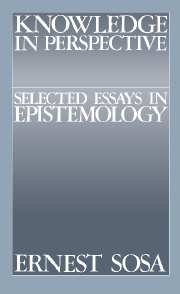Book contents
- Frontmatter
- Contents
- Sources and acknowledgments
- Introduction: back to basics
- PART I WHAT IS KNOWLEDGE, AND HOW IS IT POSSIBLE?
- PART II THEORIES OF JUSTIFICATION
- PART III INTELLECTUAL VIRTUE AND EPISTEMIC PERSPECTIVE: A VIEW PRESENTED
- PART IV INTELLECTUAL VIRTUE IN PERSPECTIVE: THE VIEW DEVELOPED
- 13 Knowledge and intellectual virtue
- 14 Methodology and apt belief
- 15 Equilibrium in coherence?
- 16 Intellectual virtue in perspective
- Index
13 - Knowledge and intellectual virtue
Published online by Cambridge University Press: 08 January 2010
- Frontmatter
- Contents
- Sources and acknowledgments
- Introduction: back to basics
- PART I WHAT IS KNOWLEDGE, AND HOW IS IT POSSIBLE?
- PART II THEORIES OF JUSTIFICATION
- PART III INTELLECTUAL VIRTUE AND EPISTEMIC PERSPECTIVE: A VIEW PRESENTED
- PART IV INTELLECTUAL VIRTUE IN PERSPECTIVE: THE VIEW DEVELOPED
- 13 Knowledge and intellectual virtue
- 14 Methodology and apt belief
- 15 Equilibrium in coherence?
- 16 Intellectual virtue in perspective
- Index
Summary
An intellectual virtue is a quality bound to help maximize one's surplus of truth over error; or so let us assume for now, though a more just conception may include as desiderata also generality, coherence, and explanatory power, unless the value of these is itself explained as derivative from the character of their contribution precisely to one's surplus of truth over error. This last is an issue I mention in order to lay it aside. Here we assume only a teleological conception of intellectual virtue, the relevant end being a proper relation to the truth, exact requirements of such propriety not here fully specified.
Whatever exactly the end may be, the virtue of a virtue derives not simply from leading us to it, perhaps accidentally, but from leading us to it reliably: e.g., “in a way bound to maximize one's surplus of truth over error.” Rationalist intuition and deduction are thus prime candidates, since they would always lead us aright. But it is not so clearly virtuous to admit no other faculties, seeing the narrow limits beyond which intuition and deduction will never lead us. What other faculties might one admit?
There are faculties of two broad sorts: those that lead to beliefs from beliefs already formed, and those that lead to beliefs but not from beliefs.
- Type
- Chapter
- Information
- Knowledge in PerspectiveSelected Essays in Epistemology, pp. 225 - 244Publisher: Cambridge University PressPrint publication year: 1991
- 11
- Cited by



